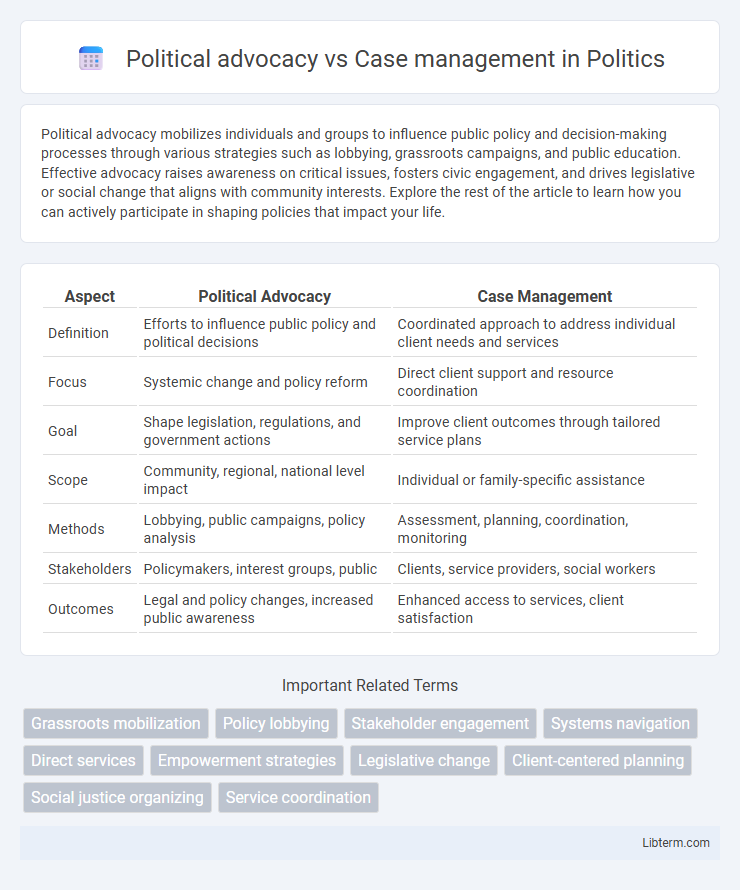Political advocacy mobilizes individuals and groups to influence public policy and decision-making processes through various strategies such as lobbying, grassroots campaigns, and public education. Effective advocacy raises awareness on critical issues, fosters civic engagement, and drives legislative or social change that aligns with community interests. Explore the rest of the article to learn how you can actively participate in shaping policies that impact your life.
Table of Comparison
| Aspect | Political Advocacy | Case Management |
|---|---|---|
| Definition | Efforts to influence public policy and political decisions | Coordinated approach to address individual client needs and services |
| Focus | Systemic change and policy reform | Direct client support and resource coordination |
| Goal | Shape legislation, regulations, and government actions | Improve client outcomes through tailored service plans |
| Scope | Community, regional, national level impact | Individual or family-specific assistance |
| Methods | Lobbying, public campaigns, policy analysis | Assessment, planning, coordination, monitoring |
| Stakeholders | Policymakers, interest groups, public | Clients, service providers, social workers |
| Outcomes | Legal and policy changes, increased public awareness | Enhanced access to services, client satisfaction |
Understanding Political Advocacy
Political advocacy involves strategic efforts to influence public policy, legislation, and resource allocation by engaging with lawmakers, stakeholders, and the broader community. It requires a deep understanding of the political landscape, including lobbying techniques, coalition building, and public campaigning to address systemic issues. Unlike case management, which focuses on individualized support and service coordination, political advocacy targets structural change to benefit larger populations.
Defining Case Management
Case management involves coordinating personalized services and resources to address individual client needs, ensuring holistic support through assessment, planning, and follow-up. It focuses on direct intervention and practical assistance within social, healthcare, and community systems. Political advocacy, in contrast, seeks systemic change through influencing policies and legislation to benefit broader populations.
Key Objectives of Political Advocacy
Political advocacy aims to influence public policy and decision-making by engaging lawmakers and stakeholders to promote systemic change. Its key objectives include shaping legislation, raising public awareness on critical issues, and mobilizing community and stakeholder support to affect government action. Unlike case management, which focuses on providing direct individual support, political advocacy targets broad societal reforms to address root causes of social problems.
Primary Goals of Case Management
Case management primarily focuses on coordinating services and support to meet individual client needs, ensuring access to healthcare, social services, and resources for improved well-being. The goal is to provide personalized assistance that promotes client empowerment, continuity of care, and efficient resource utilization. Unlike political advocacy, which seeks systemic policy changes, case management emphasizes direct client-centered interventions and problem-solving.
Core Differences between Advocacy and Case Management
Political advocacy involves influencing public policies, legislation, and community resources to address systemic issues, while case management focuses on providing personalized support and services to meet an individual's immediate needs. Advocacy targets broad societal change by engaging stakeholders and policymakers, whereas case management coordinates resources and interventions tailored to a client's specific circumstances. The core difference lies in advocacy's emphasis on structural reform versus case management's focus on individualized care and problem-solving.
Skills Required for Effective Political Advocacy
Effective political advocacy demands strong communication skills, strategic thinking, and an in-depth understanding of policy-making processes to influence legislation and public opinion. Advocates must possess negotiation abilities, coalition-building expertise, and data analysis skills to mobilize support and craft compelling arguments. Unlike case management, which emphasizes individualized client support and problem-solving, political advocacy requires broader systemic insight and public engagement capabilities.
Essential Competencies in Case Management
Essential competencies in case management include comprehensive assessment, individualized care planning, and effective resource coordination, which emphasize direct client support and problem-solving. Political advocacy prioritizes influencing policy and systemic change but lacks the personalized intervention skills fundamental in case management. Mastery of communication, cultural competence, and ethical decision-making are critical for case managers to address client needs within complex healthcare and social service systems.
Impact on Policy and Individual Outcomes
Political advocacy drives systemic change by influencing legislation, public policies, and resource allocation, thereby benefiting entire communities. Case management targets individual outcomes through personalized support, addressing specific client needs like healthcare, housing, or legal assistance. While advocacy shapes the broader environment affecting many, case management delivers direct, tailored interventions that improve personal well-being.
Collaboration in Advocacy and Case Management
Political advocacy involves influencing policy changes through coordinated efforts with lawmakers, community groups, and stakeholders, emphasizing strategic collaboration to amplify impact. Case management focuses on individualized support, requiring collaboration among healthcare providers, social workers, and clients to address specific needs effectively. Both approaches rely on multidisciplinary teamwork to ensure comprehensive solutions, blending systemic change with personalized intervention.
Choosing the Right Approach: Advocacy or Case Management
Choosing the right approach between political advocacy and case management depends on the scale and nature of the issue. Political advocacy targets systemic change by influencing policies, laws, and public opinion, ideal for addressing widespread social problems. Case management focuses on individual or group support, providing tailored services and resources to meet specific client needs and improve their immediate circumstances.
Political advocacy Infographic

 libterm.com
libterm.com